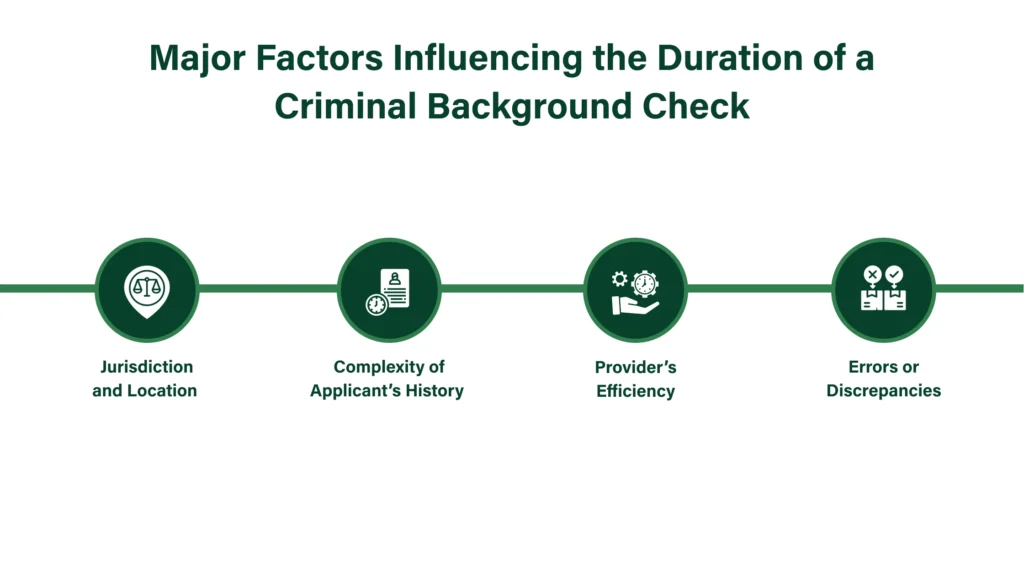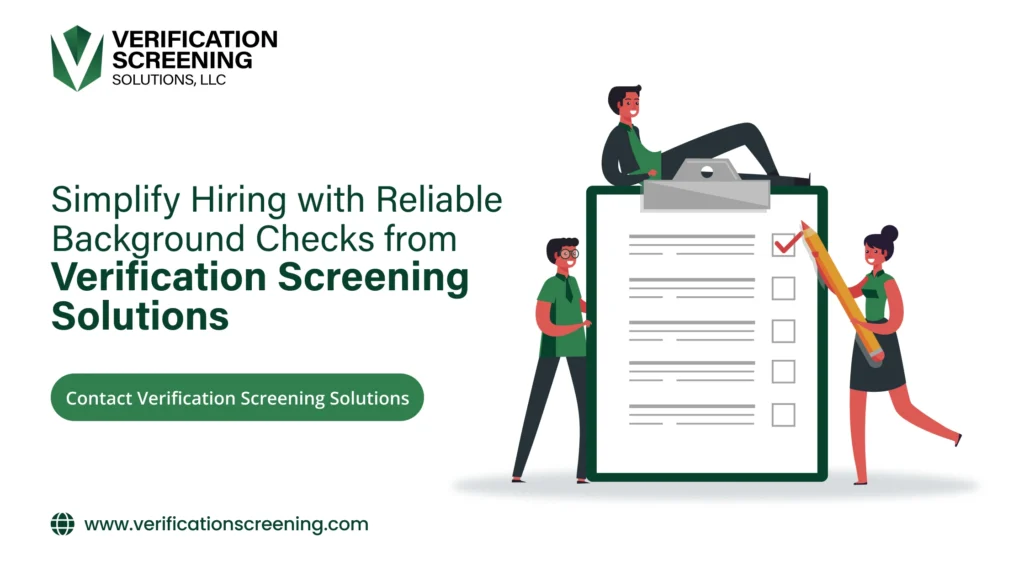Did you know that one in three Americans—around 70 to 100 million people—have criminal records? This staggering statistic shows the importance of criminal background screening as a cornerstone of modern hiring practices.
A 2021 PBSA survey revealed that 93% of employers in the United States rely on criminal background checks to vet candidates. Whether you’re hiring for a corporate leadership role, a healthcare position, or an entry-level job, conducting these checks is essential for ensuring the safety and integrity of your workforce.
However, one question employers frequently ask is: How long does a criminal background check take?
In this blog, we will discuss the factors influencing the duration of criminal background checks and timelines and offer tips for streamlining the process while maintaining compliance.
Major Factors Influencing the Duration of a Criminal Background Check

The time to complete a criminal background check can vary based on several factors, including the type of criminal background check conducted. Understanding these variables can help employers manage expectations and ensure a smooth hiring process.
1. Jurisdiction and Location
The location where the background check is conducted plays a critical role in timing. Some counties or states have more efficient systems, while others may require manual records checks, which can extend the timeline.
- Urban vs Rural Areas: Urban areas have faster turnaround times due to better technological infrastructure, while rural areas may take longer due to limited access to electronic databases.
- Out-of-State Records: If an applicant has lived in multiple states, checks may need to be conducted across various jurisdictions, increasing the time required.
For more details on how jurisdictions and databases impact criminal background checks, read An Ultimate Guide to National Criminal Database Search for Employers.
2. Complexity of Applicant’s History
An applicant with a complex or extensive criminal history may require more time for thorough verification. This could involve searching multiple counties or states, reviewing sealed or expunged records, and cross-referencing numerous records. However, a clean history will likely ensure the check is completed more quickly.
For details on potential red flags, check out our guide on What Shows Up In a Background Check and Potential Red Flags.
3. Provider’s Efficiency
Not all background check providers are created equal. Some use advanced technology to deliver fast results, while others may rely on outdated methods or have limited access to databases. Choosing a reliable background screening provider can speed up the process and reduce delays.
4. Errors or Discrepancies
In some cases, errors in the applicant’s information or discrepancies between the data provided and what’s found in the background check can delay the process. For example, additional verification may be needed if there’s a name mismatch or multiple people with similar names.
Approximate Timeframes for Criminal Background Checks
| Criminal Check | Approximate Duration |
| County Criminal Check | 1-3 business days |
| Statewide Criminal Check | 1-5 business days |
| Federal Criminal Check | 5-7 business days |
| National Criminal Database Search | 1-2 business days |
| FBI Fingerprint-Based Check | 1-4 weeks |
Below is a detailed breakdown of the most common types of criminal background checks, their timeframes, and potential reasons for delays.
1. County Criminal Check
A county criminal check is one of the most common background checks employers use. This check involves searching the local county’s criminal database to uncover any felony or misdemeanor convictions within the county where the applicant has lived.
Timeframe: 1-3 business days
Factors Affecting the Timeline
Jurisdictional Differences: County databases vary widely in terms of accessibility. Some counties may offer electronic access to criminal records, allowing for fast retrieval, while others may rely on manual record-keeping or clerical staff, which can slow down the process.
Multiple Counties: If the applicant has lived in various counties within a state, each county may need to be checked individually. This can add to the time required to complete the search.
Potential Delays
- Processing times can be extended in counties with manual record-keeping systems or delayed data entry.
- If the applicant has lived in multiple counties or states, the search may need to be extended to additional jurisdictions, prolonging the check.
2. Statewide Criminal Check
A statewide criminal check searches the criminal records of a specific state. This check includes data from state-level sources, such as state police records and court databases.
Timeframe: 1-5 business days
Factors Affecting the Timeline
Database Access: States with centralized, automated criminal record databases allow for quicker searches. Some states have digitalized their criminal records, while others may still rely on slower manual processes.
State-Specific Regulations: States may have varying rules about what information can be accessed and who can request it. These checks may take longer in states with strict regulations or slow processing systems.
Potential Delays
- Manual vs. Automated Systems: States with limited online access to criminal databases or those that require manual checks through local law enforcement may see delays.
- Outdated Databases: Some states may have databases that are not frequently updated, potentially leading to delays in retrieving accurate information.
3. Federal Criminal Check
A federal criminal check examines records held by federal agencies, such as the FBI, for violations of federal law. It can uncover convictions related to white-collar crimes, drug trafficking, immigration violations, or federal fraud.
Timeframe: 5-7 business days
Factors Affecting the Timeline
Database Access: Federal checks typically involve searching multiple databases (e.g., PACER, FBI criminal databases). The process requires coordination with federal agencies, which can be slower than county or state checks.
Specific Federal Jurisdiction: Federal crimes often involve more complex and widespread investigations, which may require cross-referencing multiple sources, further extending the time needed to retrieve complete information.
Potential Delays
- Volume of Requests: Federal background checks are often subject to high requests, especially for agencies like the FBI. This can cause delays in retrieving the necessary information.
- Manual Verification: In some cases, records might need to be verified manually, which can add a few extra days to the timeline.
4. National Criminal Database Search
A national criminal database search is a broad search that pulls information from multiple jurisdictions across the U.S. It aggregates criminal records from various states, counties, and federal databases. This check is used as an initial screening tool and is fast, primarily relying on electronic databases.
Timeframe: 1-2 business days
Factors Affecting the Timeline
Database Quality and Coverage: The speed of a national database search depends on the quality of the database and how frequently it is updated. A comprehensive database with extensive data from all states will yield faster results.
Scope of the Search: A national check can quickly return a lot of data, but it may also pull in irrelevant or outdated records that need to be filtered manually, which could delay results.
Potential Delays
- Data Inconsistencies: Because the national database aggregates information from so many sources, data inconsistencies or missing information may require manual review and verification, which can add time.
- Outdated Data: National databases are only as current as the data fed into them. Some jurisdictions may not submit timely updates, so delays can occur if the database contains outdated records.
5. FBI Fingerprint-Based Check
The FBI fingerprint-based check is one of the most thorough and accurate methods for conducting a criminal background check. This process involves submitting an individual’s fingerprints to the FBI, which then searches its database of criminal records.
Timeframe: 1-4 weeks
Factors Affecting the Timeline
Fingerprint Processing: The time it takes to submit and process fingerprints can vary. Some applicants may have their fingerprints processed within a few days, while others may experience delays due to fingerprint quality or technical issues.
FBI Processing Delays: Given the FBI’s role in processing requests from across the country, delays can occur due to the high volume of requests or backlogs at the national level.
Potential Delays
- Fingerprint Quality: If the submitted fingerprints are of poor quality or require re-submission, the process could take several days or even weeks.
- High Volume of Requests: The FBI processes criminal background checks for many entities, which can lead to delays during peak times, such as hiring surges or federal election periods.
Simplify Hiring with Reliable Background Checks from Verification Screening Solutions

At Verification Screening Solutions, we take the hassle out of background checks, offering customized solutions to meet your hiring needs. From county-level criminal searches to comprehensive federal checks, our fast and accurate services help you:
- Hire with confidence by ensuring the safety and integrity of your workforce.
- Stay compliant with FCRA and other legal standards.
- Save time with quick turnarounds and the latest technology.
Our services include:
Ready to streamline your hiring process?
Contact us today to see how our comprehensive background screening services can protect your business and empower informed decisions.

